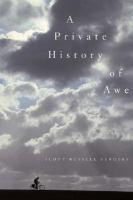
 In A Private History of Awe, Scott Russell Sanders takes a thunderstorm and illustrates how it can dance across three generations. Sanders not only spotlights the beauty and spectacle a thunderstorm can create, but also its rude and wild fury.
In A Private History of Awe, Scott Russell Sanders takes a thunderstorm and illustrates how it can dance across three generations. Sanders not only spotlights the beauty and spectacle a thunderstorm can create, but also its rude and wild fury.
This is one man’s deeply personal path of awe, a memoir of sorts, but mostly the story of how one soul can become so beautifully entangled in both life and death. Throughout the story of Sanders’ life are these spectacular vignettes of his newborn grandchild as she embarks on her new path and his mother, who is at the end of hers, creating a richly dimensional portrayal of the blurred edges of life and death.
I was overwhelmed with Sanders’ spiritual landscape, how he was initially overcome by the poetry of the bible, but became disillusioned with its deliverance. At certain moments in the book the reader is swept up in the beauty of the church, of Quaker ideals and the music of psalms, only to be suddenly caught in the muck of Sanders’ disgust and confusion concerning the violence and hypocrisy in the bible. Sanders’ brazen vulnerability commands a response. Whether you tuck his words away, or openly wear them for others to see, they’ll grow inside of you, perhaps a little like the mustard seed that clanks around in all of us. It is very likely that awe and faith share a little camaraderie.
I will leave you with my favorite quote:
I would have been happy to save my soul – assuming it was salvageable – but I couldn’t accept that we were born into this world merely to angle for a favorable deal in the next one. Surely there was work we should be doing right here, right now, in this amazing flesh and brimming instant. Surely there must be some purpose in life larger than one’s own private salvation. Surely the fate of one’s soul is bound up with the fate of one’s neighbors and neighborhood.
